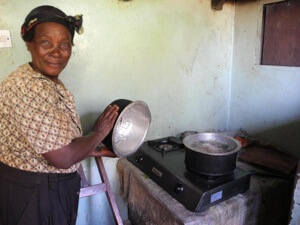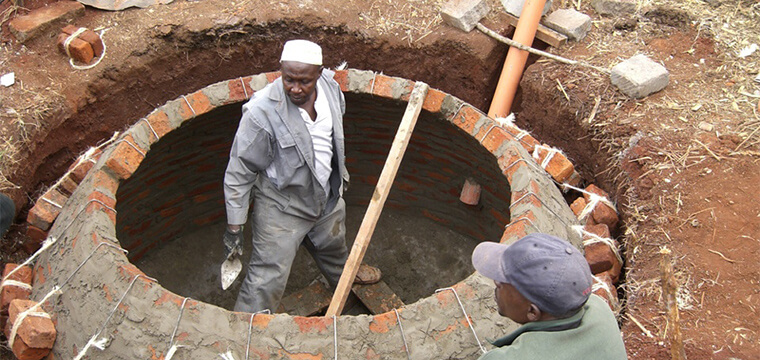 Smart investment
Smart investment
to fight climate change
A couple of days ago the 19th international conference on climate change came to an end in Warsaw. The conference did not achieve any major results, even though small intermediate progress could be made. Whether climate change is a problem for humanity or not is not any more at the heart of discussions. However, parties have a hard time in agreeing on which country has to save how many emissions and who has to pay how much to the countries that are most affected by the consequences of climate change. In short: it is all about the money. The current major ambition is to reach a global binding agreement by the conference in Paris in 2015. Far away from the sleepless nights of the delegates in cold Warsaw, climate change is already showing its destructive power in Kenya. The Masai are traditional cattle herdsmen. Masais are known as courageous and legendary warriors. However, when drought comes they get into existential penury. They cannot feed their cattle anymore and struggle to survive. On another edge of the country, precisely on Africa’s highest mountain (Mount Kilimanjaro) the glacier has shrunken dramatically. This is problematic, because it plays a crucial role for the functioning of the local ecosystem. Like many other developing countries, Kenya is particularly vulnerable to the consequences of climate change. At the same time, Kenya is the home country of the Nobel peace prize laureate Wangari Maathai, who has been fighting tirelessly against desertification and climate change throughout almost her entire life. Therefore, today’s good deed is going to tackle climate change in her home country.
Necessity
Sustainable energy supply for the Kenyan rural population
Activity
Financing the construction of small biogas plants.
Countable effort
Number of resulting biogas plants
Result
Hectares of avoided deforestation, CO2 savings through biogas plant per year and financial savings for families
Systemic effect
Successful technology transfer and institutionalization of sustainable energy sources
Background
In the Nairobi River Basin it often smells like fire. Due to the lacking energy infrastructure, many households cook with firewood. On average, a family needs about 10 kg of wood per day. This has far reaching consequences: The deforestation rate in the region is quite high, which leads to increasing CO2 emissions. Furthermore, the high demand for firewood makes it extremely expensive for the local population. However, at the same time most households own 2-3 cows for domestic milk production and this is actually a perfect starting condition for household based biofuel power plants.
The good deed
Through todays good deed the construction of various biogas power plants will be financed. The project tackles all mentioned problems at once. Biogas plants are operated with the cow dung from the farmers' cows. The biogas replaces wood, kerosene and natural gas as fuel for cooking. Thus, deforestation is reduced, less CO2 is emitted and families save money and time for the fuel procurement. A by-product of the biogas production is nutrient-rich manure, which the farmers can use for their own cultivations or sell it and, thus, gain additional income. Families can make their way out of poverty in the long term, local biodiversity is protected and the world's climate is spared.
Challenge
The relatively high initial investment costs are a particular challenge for bigas energy production in Kenya. Even if the system becomes financially viable very quickly, some very poor families cannot afford the investment despite subsidies. Therefore, donations from the 24GoodDeeds advent calendar are going to be used for to fully finance the power plants for the poorest families.

AboutKenya
Nairobi
Capital
44,354,000 (2013)
Number of inhabitants
977
Gross domestic product per capita per year
145
Human Development Index
More than half of Kenya's population is under 19 years old.
About the organization and further information
Association
atmosfair gGmbH
Transparent civil society initiative 2012, 24guteTaten partner organization with exemplary documentation center
Further information and source
- http://cdm.unfccc.int/Projects/DB/RWTUV1245685309.5/view
- http://cdm.unfccc.int/about/ccb/CDM_Cobenefits_Guinea_Savanna_Nigeria.pdf
- http://cdm.unfccc.int/about/multimedia/stories/index.html
- http://www.jiko-bmu.de/basisinformationen/nachrichten_termine/doc/1120.php
- WGBU, Transformation zur Nachhaltigkeit, Wissenschaftlicher Beirat der Bundesregierung Globale Umweltveränderung, Factsheet N° 4, 2011.
- Die ausführliche offizielle Projektdokumentation unter anderem das Project Design Document, findet sich auf der Seite des UN-Klimarats UNFCCC
- Das Klimaschutzprojekt in Nigeria wurde vom UNFCCC als eines von 10 Projekten mit außergewöhnlichem Zusatznutzen ausgewählt
- UNFCCC Interview mit Yahaya Ahmed, Vorsitzender des Projektpartners DARE
- Interview des Bundesumweltministeriums (BMU) mit atmosfair




